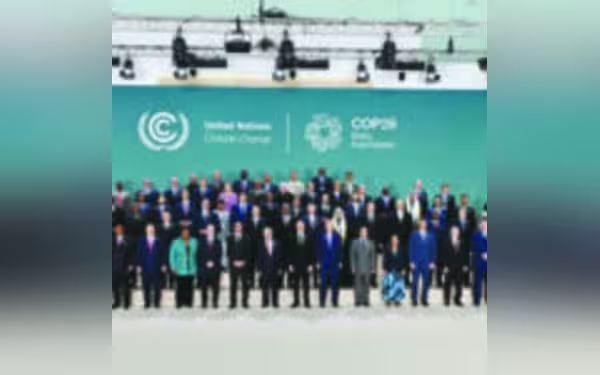Wednesday, January 15, 2025 10:55 PM
COP29 Climate Finance Commitments Fall Short
- Developed nations pledge only $300 billion for climate finance.
- Experts warn 2024 could be the warmest year on record.
- India criticizes COP29 commitments as 'abysmally poor'.
 Image Credits: pakistantoday
Image Credits: pakistantodayCOP29 highlights inadequate climate finance commitments, with developed nations pledging only $300 billion, far below the required $1.3 trillion.
The recent COP29 climate conference has once again highlighted the urgent need for substantial climate finance commitments from developed nations. As the world grapples with the escalating impacts of climate change, the inadequacy of financial pledges made by major polluters raises serious concerns about our collective ability to combat this global crisis. A report by ‘Climate Action Tracker’ has identified key carbon emitters, including the United States, China, and India, which together accounted for a staggering 63 percent of global greenhouse gas emissions in 2022. This situation demands immediate action and leadership from these nations to set ambitious targets for emissions reduction.
According to the report, developed countries must commit to providing $1.3 trillion annually to effectively keep global warming below the critical threshold of 1.5°C. This level is crucial, as exceeding it could lead to irreversible changes to our planet, including the collapse of ice sheets and the death of coral reefs. However, the reality is disheartening; developed nations have only pledged a mere $300 billion, a figure that is grossly insufficient and is to be reached by 2035. This paltry amount falls far short of the $1 trillion needed annually by 2030, as highlighted by the ‘Third report of the independent high-level expert group on climate finance’.
Furthermore, the Financial Times has pointed out that climate finance should include $256 billion in annual grants to support developing countries. The argument is clear: stabilizing the world’s climate is in everyone’s interest. The current approach, which relies on national capital markets, is a market failure that needs urgent correction. Citizens of wealthier nations must step up to subsidize the risks faced by poorer countries, ensuring that clean energy solutions are accessible globally.
As we approach the alarming reality of global temperatures nearing the 1.5°C mark, experts warn that 2024 could be the warmest year on record. The urgency of the situation cannot be overstated. The recent COP29 meetings concluded with a commitment of $1.3 trillion, but critics have labeled this outcome as a “travesty of justice.” Negotiators from countries like India have expressed that the agreed amount is “abysmally poor” compared to what is truly needed to address the climate crisis.
The commitments made at COP29 reflect a troubling trend of insufficient action from developed nations in the face of a climate emergency. As the impacts of climate change become increasingly severe, it is imperative that these countries step up their financial commitments and take decisive action. The future of our planet depends on it, and the time for half-measures has long passed. It is crucial for all nations to recognize their role in this global challenge and work collaboratively towards sustainable solutions that benefit everyone.













